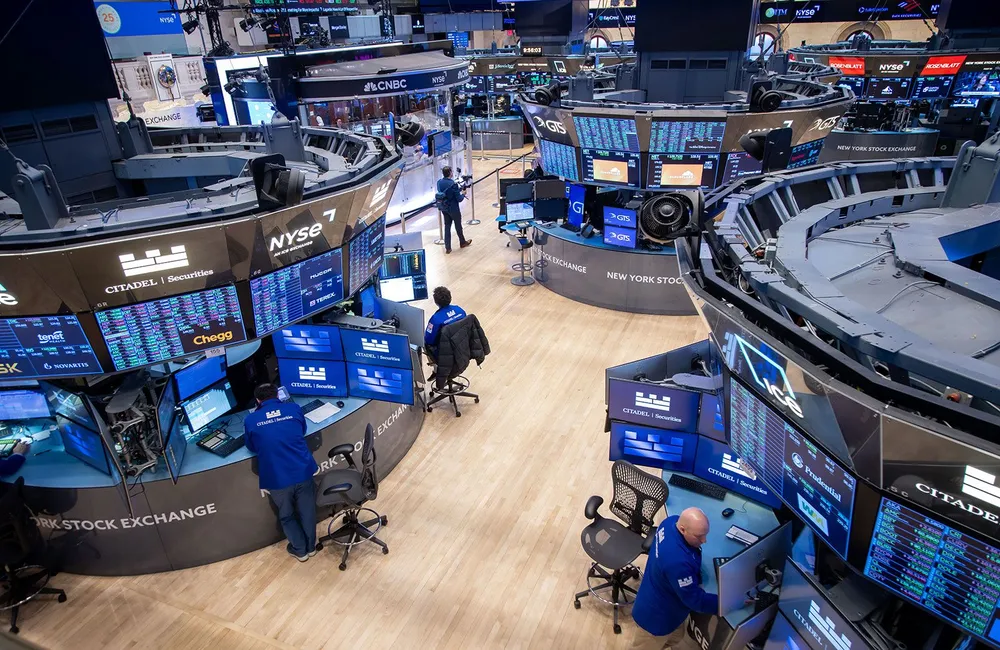ASX futures rose 70 points or 1 percent at 6861 at 8:00am Friday, indicating a higher open.
Overseas, S&P 500 futures were 1.2 percent higher, after the index jumped in the previous session. The broad market index closed sharply higher on Wednesday after the Federal Reserve lifted interest rates and Chairman Jerome Powell suggested that the pace of rate rises would ultimately slow. The Dow Jones Industrial Average rose 1% and the technology-heavy Nasdaq Composite Index advanced 1.1%.
The US economy contracted at an annualized rate of 0.9% in the last quarter, the Commerce Department announced Thursday, and it was the second straight quarter of declining gross domestic product. The data sharpened a debate among analysts and investors about whether the economy is in a recession.
Commodities
Iron ore 4.4% at $US 117.35, Brent crude oil 1.1% higher at $US107.84 and gold was up 1.8% to $US 1769.20. Local bonds moved higher again on Thursday as the yield of Australian 2 Year government bonds declined back to 2.54% and 10 Year fell to 3.20%. On Overseas, yield on 2 Year US Treasuries decreased 2.86% and the yield on 10 Year US Treasuries moved down to 2.68%. The Australian dollar was buying 69.89 US cents, compared to 69.87 US cents at the previous close. The WSJ Dollar Index, which measures the U.S. currency against 16 others, fell further to 97.97.
Asia
Chinese stocks ended the day mixed as advances in electronics were outweighed by losses among airlines and pharma companies. After the Fed’s rate decision, the market may pick up an upward trend once uncertainty declines, Guosheng Securities wrote in a note. Luxshare Precision surged 8.7% and StarPower Semiconductor was up 7.8%, while Shenzhen Mindray Bio-Medical fell 2.8%. Airlines were also laggards. Air China, China Eastern Airlines and China Southern Airlines were down 1.8% to 3.5%. The Shanghai Composite Index rose 0.2% to 3282.58 and the Shenzhen Composite Index gained 0.4%, while the ChiNext Price Index finished down 0.3%.
Hong Kong stocks erased early gains as financial stocks weighed, with the Hang Seng Index finishing 0.2% lower at 20622.68. Lenders were down after the US Fed hiked the funds rate 75 bps. China Merchants Bank lost 2.0%, Hang Seng Bank fell 0.9% and BOC Hong Kong slipped 0.7%. Hang Lung Properties rose 1.8% after it said market sentiment in Hong Kong had solidly rebounded since mid-April. The conglomerate CK Asset rose 0.4 percent after announcing its bid on China Evergrande’s Hong Kong headquarters. “For the near term, the focus will be on the potential phone call next week between US President Biden and Chinese President Xi Jinping, and any indication of progress on removing US tariffs on China goods,” IG market strategist Yeap Jun Rong says in a note.
The Nikkei Stock Average ended up 0.4% at 27815.48, tracking a broad advance in Asian shares after the US Fed rate hike. Shares of energy companies gained with oil prices after settling at a one-week high overnight. Idemitsu Kosan rose 1.9%, Eneos Holdings added 0.7% and Cosmo Energy rose 2.5%. Mitsubishi Electric dropped 5.7% on a quarterly net profit that missed consensus. Toyota Motor fell 2.0% after its group global sales for June fell from a year earlier. Investors can expect more focus on corporate earnings.
Europe
European stocks mostly rose at the close of trade as investors weighed corporate results and the latest interest rate decision from the Federal Reserve. The pan-European Stoxx Europe 600 rose 1.1 percent, and the German DAX rose 0.9 percent, while the French CAC 40 gained 1.3 percent. Ipsen shares surged 15.6% after the French pharmaceuticals group lifted its full-year guidance. Scor fell 18.9% as the French life insurer swung to a first-half net loss. Meanwhile, the US economy unexpectedly shrank in the second quarter, adding to the concern after the Fed said future rate decisions will be dependent on data. “Markets are writing off Fed rate hikes beyond the end of this year,” says CMC Markets analyst Michael Hewson.
London’s FTSE 100 ended Thursday down 0.04% due to falls in healthcare, telecoms and banking shares. On the downside, Smith & Nephew PLC shares tumbled after the company posted a small drop in trading profit given a decline in margins and as BT Group PLC fell also after a 7% drop in enterprise operations revenue, which elicits concerns about “further weakness to come,” according to Michael Hewson, chief market analyst at CMC Markets U.K.
At the other end of the spectrum, it’s been a good day for Shell PLC, which saw another record quarter of profits, though this makes the inevitable question about whether it is sustainable at the half two-way, notes Mr. Hewson in a research comment.
North America
Stocks were higher on Thursday even as new data came in showing that the US economy shrank for the second quarter in a row.
The S&P 500 rose 1.2 percent, extending its strong advance from the previous session. The broad market index ended sharply up Wednesday after the Federal Reserve lifted interest rates and its Chairman, Jerome Powell, hinted that the pace of rate increases would eventually slacken. The Dow Jones Industrial Average rose 1%, and the technology-focused Nasdaq Composite Index rose 1.1%.
The Commerce Department reported that the US economy contracted at a 0.9% annual rate last quarter, its second straight quarterly contraction in gross domestic product. The data further fuelled debate among analysts and investors over whether the economy is already in recession.
Stocks have entered the third quarter in stronger fashion following declines in the first half of the year. Corporate profits have not been as terrible as investors had feared, implying that skyrocketing inflation and symptoms of weakening economic growth are not pressing on companies’ balance sheets too hard.
All three of the major indexes are up at least 8 percent from their lows of 2022 in mid-June and on track for sizable monthly gains. The Fed has indicated that it is committed to lowering inflation. On Wednesday it raised the federal-funds rate by three-quarters of a percentage point to a range of between 2.25% and 2.5%. Some traders have piled into bets on a slower pace of interest level increases in the next few months after the meeting, contributing to the stock-market rally.
In the bond markets, the yield on 10-year US Treasuries fell for a third day in a row, to 2.680% from 2.731% on Wednesday. The 2-year note tumbled to 2.874% from 2.968%.
While the major stock indexes have gained recently, some investors continue to worry about stretched valuations and the speed at which the Fed will raise rates. “The rally we’ve seen seems like the type of rally you see in a classic bear market, not the start of a new bull market,” said David Donabedian, the chief investment officer of CIBC Private Wealth US. “We are going to continue to have an environment where we have inflation uncomfortably high and growth uncomfortably low, and that’s not a good backdrop. The investors have turned to the earnings reports of big blue-chip and technology companies for clearer signs of the state of the economy.
After markets closed, Amazon.com posted another quarterly loss but indicated it is having some success tamping down costs, sending its shares 12% higher in after-hours trading. Apple shares increased 2.8% after the company said iPhone sales were still climbing, even as the economy slowed. But Intel shares plunged 8.9% after it reported a surprise quarterly loss, cut its full-year guidance and forecast a decline in chip prices, as personal-computer buying slumps and the company has delayed the launch of new products.
In other corporate news, shares of Facebook’s parent company, Meta Platforms, dropped $8.86, or 5.2 percent, to $160.72, after Meta disclosed its first-ever drop in quarterly revenue. Qualcomm fell $6.97, or 4.5 percent, to $146.45 after issuing a lackluster sales outlook. Ford rose 6.1 percent, or 81 cents, to $14 after announcing a 50 percent increase in revenue.
Shares in Spirit Airlines rose $1.36, or 5.6 percent, to $25.66, after JetBlue Airways reached a deal to buy the discounter. The agreement came after a report in The Wall Street Journal that the two companies were near a deal that followed a monthslong bidding war between JetBlue and Frontier Group Holdings. JetBlue fell 3 cents, or 0.4 percent, to $8.37.




















